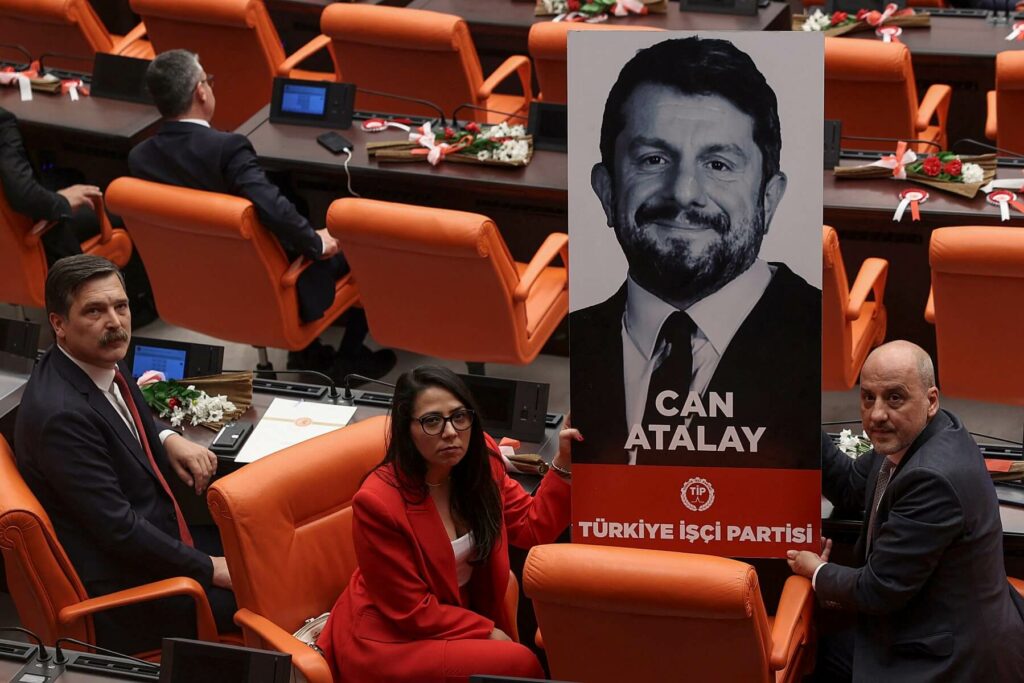An extraordinary session in the Turkish parliament on Friday that deteriorated into a brawl among ruling and opposition party lawmakers produced no results beneficial to a jailed politician who had been ousted from the legislature, with an attempt to restore his seat failing.
Lawmakers of the ruling Justice and Development Party (AKP), which holds a majority in the parliament, rejected by a majority of votes a request from the opposition to hold a general session to discuss the restoration of the seat of Can Atalay, who was elected to parliament in the May 2023 general election from the left-wing Workers’ Party of Turkey (TİP).
The extraordinary session ended without a discussion of Atalay’s situation.
Atalay is serving an 18-year sentence that was upheld by the top appeals court last year after his conviction in what’s known as the Gezi Park trial, concerning anti-government protests in 2013, labelled as a “politically motivated” trial by many.
He was not released from prison despite two Constitutional Court rulings in his favor and was stripped of his parliamentary seat earlier this year.
Friday’s extraordinary session, called by the opposition, was marked by a violent brawl that erupted when AKP MP Alpay Özalan attacked TİP lawmaker Ahmet Şık while he was delivering a speech at the beginning of the session in which he condemned the government over its treatment of Atalay.
Two opposition lawmakers who tried to calm the other deputies down as they traded punches were injured.
Video footage from parliament showed blood on the floor from the injured lawmakers, who sustained cuts to their foreheads.
In his speech Şık accused AKP lawmakers of being members of the “biggest terrorist organization” in Turkey who “brought down the state with the dynasty mafia,” a reference to a “terrorist” description President Recep Tayyip Erdoğan used for Atalay.
He said it is not surprising for the AKP and its leader to call Atalay a “terrorist” since they do so for everyone who is not a member of their party.
The parliament speaker’s office later sanctioned Özalan for his attack on Şık and Şık for his accusations against the AKP lawmakers.
The attack on Şık and the fistfight in parliament has attracted strong condemnation from opposition parties, which called it an “attack on the public will.”
Extraordinary session
The extraordinary session in the legislature was called to consider the parliamentary status of Atalay after the Constitutional Court declared the removal of his status “null and void” in early August, once again reviving calls for his immediate release and the reinstatement of his status.
A judicial crisis erupted when the Supreme Court of Appeals, which upheld the politician’s conviction, refused to rule for his release from prison last year, defying the top court’s two decisions. In a first in the history of Turkey, the appeals court also filed criminal complaints against the members of the Constitutional Court.
The Constitutional Court had ruled twice last year that Atalay’s rights to security and liberty and the right to stand for election were violated.
The top court said in its reasoned opinion that the Supreme Court of Appeals’ decision not to implement its rulings had no legitimacy.
According to the court, it is legally impossible to talk about a conviction for Atalay following its ruling on him on October 25, 2023 and that it’s a constitutional requirement to eliminate the circumstances leading to the rights violation.
The court said a ruling that has been established to be in violation of the constitution has no legal standing.
Following the Constitutional Court’s decision, Atalay’s lawyers applied for his release, arguing that his rights to liberty and security and his right to stand for election have been violated. The opposition parties, including the CHP and others, have urged the parliament to act quickly to reinstate his status.
If the court’s decision were to have been read during the session, it could have initiated the process to restore Atalay’s parliamentary seat.
Atalay was stripped of his parliamentary status in January after a reading of the ruling by the Supreme Court of Appeals upholding his 18-year sentence in a riotous plenary session in parliament that saw angry chants and attempts to halt the proceedings by opposition deputies.
The 48-year-old Atalay successfully ran from prison for a seat in parliament representing the earthquake-ravaged Hatay province.
The Gezi Park trial defendants including Atalay and prominent businessman Osman Kavala were convicted of attempting to overthrow the government for their alleged role in the protests, which began over an urban development plan in central İstanbul and spread to other cities in Turkey.
The youth-driven demonstrations morphed into a nationwide protest against perceived corruption by the AKP and then-prime minister and current president Erdoğan’s growing authoritarianism.
Erdoğan’s government violently dispersed the protests and then began to crack down on its leaders.

